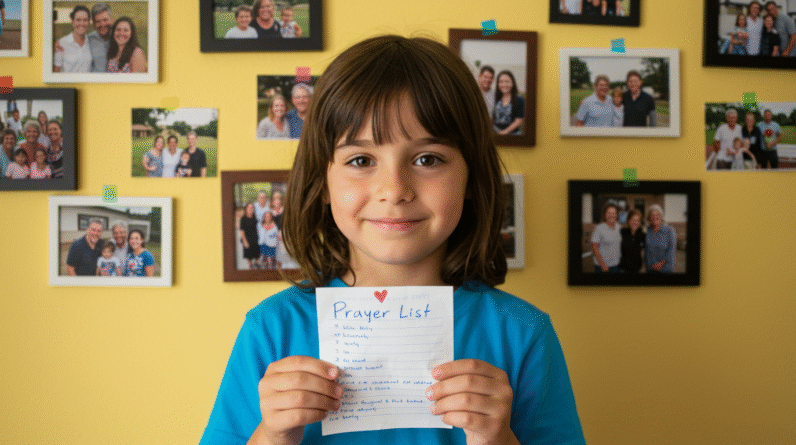Raising Faith-Filled Children Without Forcing Religion
In the journey of parenthood, guiding children towards spiritual growth can sometimes feel like walking a tightrope. You want them to develop a genuine relationship with God, but you fear they might feel coerced or pressured. Let’s unravel the delicate art of raising faith-filled children in a way that nurtures rather than dictates.
Understanding Faith and Religion
Before we dive deep into practical steps, it’s essential to differentiate between faith and religion. Faith is a personal journey—a relationship with God that is profound and deeply individual. Religion, on the other hand, encompasses the structures, traditions, and communal aspects often seen in organized worship. While they complement each other beautifully, understanding their differences is crucial in raising faith-filled children without feeling like you’re enforcing a rulebook.
Why Faith Matters
Faith isn’t just about Sunday services or reciting prayers. It’s about instilling values such as love, kindness, and empathy. It’s the quiet strength that supports you in times of adversity. When children witness authentic displays of faith, they perceive it as a natural part of life rather than an obligation.
Recognizing Forced Religion
The signs of forced religion can be subtle or overt. You might notice resistance during prayer time or hear reluctant comments about church attendance. The goal is to spark curiosity and joy rather than resentment. Remember, children have their individual pace when it comes to understanding and accepting spiritual concepts.
Modeling Faith Through Actions
Actions speak louder than words, and nowhere is this truer than in spiritual development. When your children see you living your faith authentically, they’re more likely to integrate those behaviors naturally in their lives. Let’s explore some ways to model faith effectively.
Living Your Faith Daily
Incorporate small acts of faith into your daily routine. This might mean starting your day with a moment of gratitude, openly discussing your reliance on faith during challenges, or simply practicing what you preach. For instance, showing forgiveness and softening your words can communicate volumes more than a sermon.
Sharing Personal Experiences
Share stories of how your faith has strengthened you in difficult times or guided your decision-making process. These narratives make faith relatable and applicable. Just as storytelling captivates children’s imaginations, your personal journey can kindle their spiritual curiosity and understanding.
Being Transparent About Doubts and Questions
It’s crucial to be honest about your own spiritual struggles. Allow yourself to express doubts and questions openly. This not only humanizes the faith journey but also gives children permission to question and explore their beliefs without fear of judgment or reprisal.
Creating a Faith-Friendly Environment
The atmosphere in your home can significantly impact how your children perceive and engage with faith. By curating an environment rich in spiritual inspiration, you allow children to explore faith naturally.
Incorporating Spiritual Practices
Introduce gentle spiritual practices that fit harmoniously into your daily life. This could look like evening prayers, family meditation sessions, or keeping a gratitude journal. These practices are meant to anchor spiritual habits rather than enforce them.
Providing Access to Resources
Make religious texts, stories, and music available to your children without imposing a regimented study of them. Consider having children’s versions of the Bible readily accessible. Let them explore these resources at their own pace, encouraging curiosity whenever it arises.
Encouraging Questions
Encourage your children to ask questions about faith and spirituality. With each inquiry, express patience and understanding, steering clear of definitive answers that might stifle exploration. Instead, embrace these moments as opportunities to rediscover faith through their innocent yet profound perspectives.
Fostering Open Conversations
Open communication is the cornerstone of raising faith-filled children. When your children feel safe expressing their thoughts and feelings, they’re more likely to explore their spirituality freely.
Listening Without Judgment
When your child comes to you with questions or even skepticism about faith, adopt a posture of active listening. Respond with empathy and avoid judgment. This demeanor nurtures a trusting environment where your child feels respected and understood.
Discussing Different Beliefs
Exposing children to a variety of beliefs and traditions broadens their understanding and acceptance of spirituality. Encourage respectful dialogue about different religions, demonstrating that faith, though personal, is a shared human experience.
Encouraging Thoughtful Reflection
Guide your kids in reflective practices. When discussing a moral dilemma or a Bible story, ask them their opinions and thoughts. This technique encourages them to connect their developing faith to real-world situations.

Nurturing Individual Faith Journeys
Every child is unique, and therefore, each spiritual journey will be distinct. Ensuring that you support their individual paths will empower them to form a faith that is genuine and meaningful.
Recognizing Diverse Expressions of Faith
Faith isn’t one-size-fits-all. Some children might find solace in prayer, others in service, and some through art or music. Celebrate these differences, understanding that each expression is a legitimate and beautiful connection to God.
Allowing Personal Exploration
Give children the freedom to explore their spiritual interests. Perhaps they want to attend a service at a different denomination or explore the sacred texts of another religion. These explorations can strengthen their own faith and foster a deep appreciation for spiritual diversity.
Celebrating Milestones
Acknowledge and celebrate spiritual milestones in your child’s life. This could be anything from a recitation of a prayer to a personal act of kindness inspired by faith. These celebrations reaffirm their progress and enthusiasm for their spiritual growth journey.
Building a Community of Faith
Community plays a vital role in faith-building. It offers support, friendship, and broader perspectives. Consider the positive role a faith community can have in your child’s life.
Joining a Supportive Faith Community
Find a community that aligns with your family values and somewhere your children will feel welcomed and valued. Being part of a community can provide companionship in your spiritual journey and offer your children a sense of belonging and shared purpose.
Encouraging Service and Involvement
Encourage your children to participate in community service activities. Acts of service, whether through church-sponsored programs or nonreligious organizations, emphasize the value of helping and loving others—a core tenet of faith.
Creating Family Traditions
Establish family traditions that advocate for faith and community, whether it’s volunteering on holidays, participating in church activities, or hosting family devotion nights. These experiences forge lasting connections and cherished memories rooted in spirituality.
Encouraging Personal Reflection
Young or old, personal reflection is crucial in developing a sincere faith. Helping your children cultivate this discipline can enrich their spiritual lives.
Journal-Keeping
Introduce your children to the practice of journaling. Encourage them to document not just their daily activities but their thoughts and reflections on faith, questions about God, and experiences of divine presence. This practice hones introspection and nurtures spiritual maturity.
Prayer and Meditation
Guide your children in exploring different forms of prayer and meditation. Let them discover what resonates with their souls and assist them in building the habit of conversing with God in their unique way.
Creative Expression
Encourage your children to express their faith through creativity, whether it’s painting, writing, music, or dance. Creative expression provides an emotional outlet and a form of worship that celebrates their individuality.
Final Thoughts on Raising Faith-Filled Children
Raising faith-filled children is less about teaching religion and more about embodying love, grace, and authenticity in your spiritual journey. It’s about remembering that faith is a lifelong pursuit—a discovery that evolves uniquely within each person.
Encourage your children to discover their spiritual path, and trust that their relationship with God will bloom beautifully without the need for forceful interventions. With love, patience, and guidance, you’re setting the foundations of a faith that is genuine, unshakeable, and deeply personal.
Explore More
For further reading and encouragement, check out these posts:
👉 7 Bible Verses About Faith in Hard Times
👉 Job’s Faith: What We Can Learn From His Trials
👉 How To Trust God When Everything Falls Apart
👉 Why God Allows Suffering – A Biblical Perspective
👉 Faith Over Fear: How To Stand Strong In Uncertain Seasons
👉 How To Encourage Someone Struggling With Their Faith
👉 5 Prayers for Strength When You’re Feeling Weak

📘 Jesus and the Woman Caught in Adultery – Grace and Mercy Over Judgement
A powerful retelling of John 8:1-11. This book brings to life the depth of forgiveness, mercy, and God’s unwavering love.
👉 Check it now on Amazon
As a ClickBank Affiliate, I earn from qualifying purchases.
Acknowledgment: All Bible verses referenced in this article were accessed via Bible Gateway (or Bible Hub).
“Want to explore more? Check out our latest post on Why Jesus? and discover the life-changing truth of the Gospel!”








